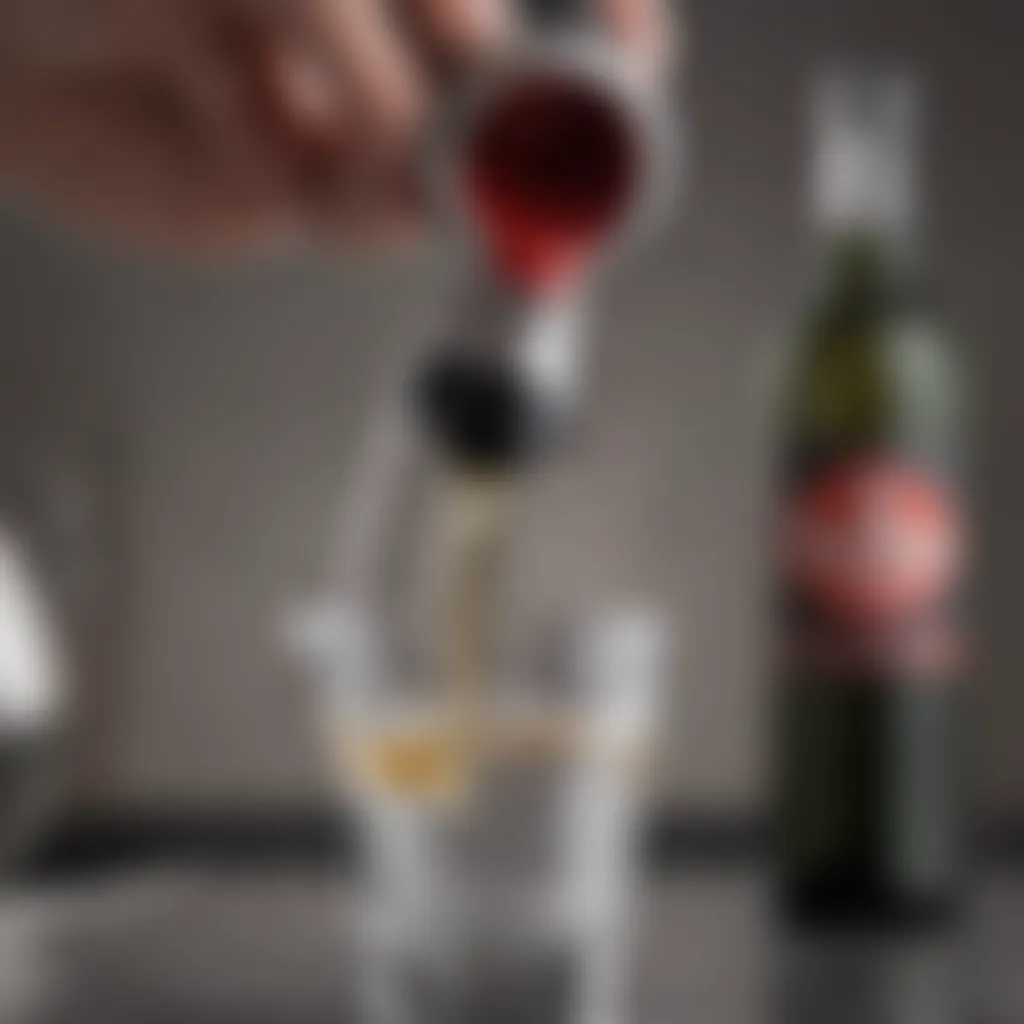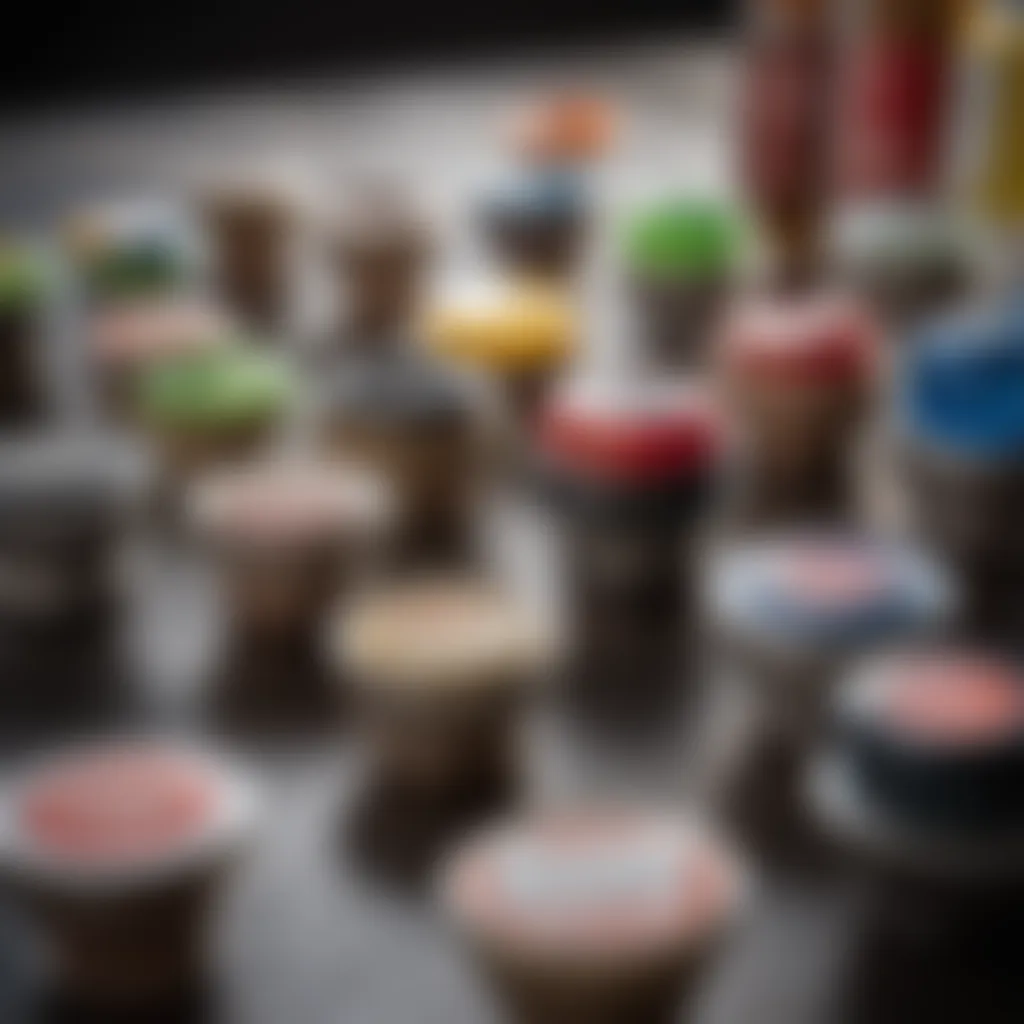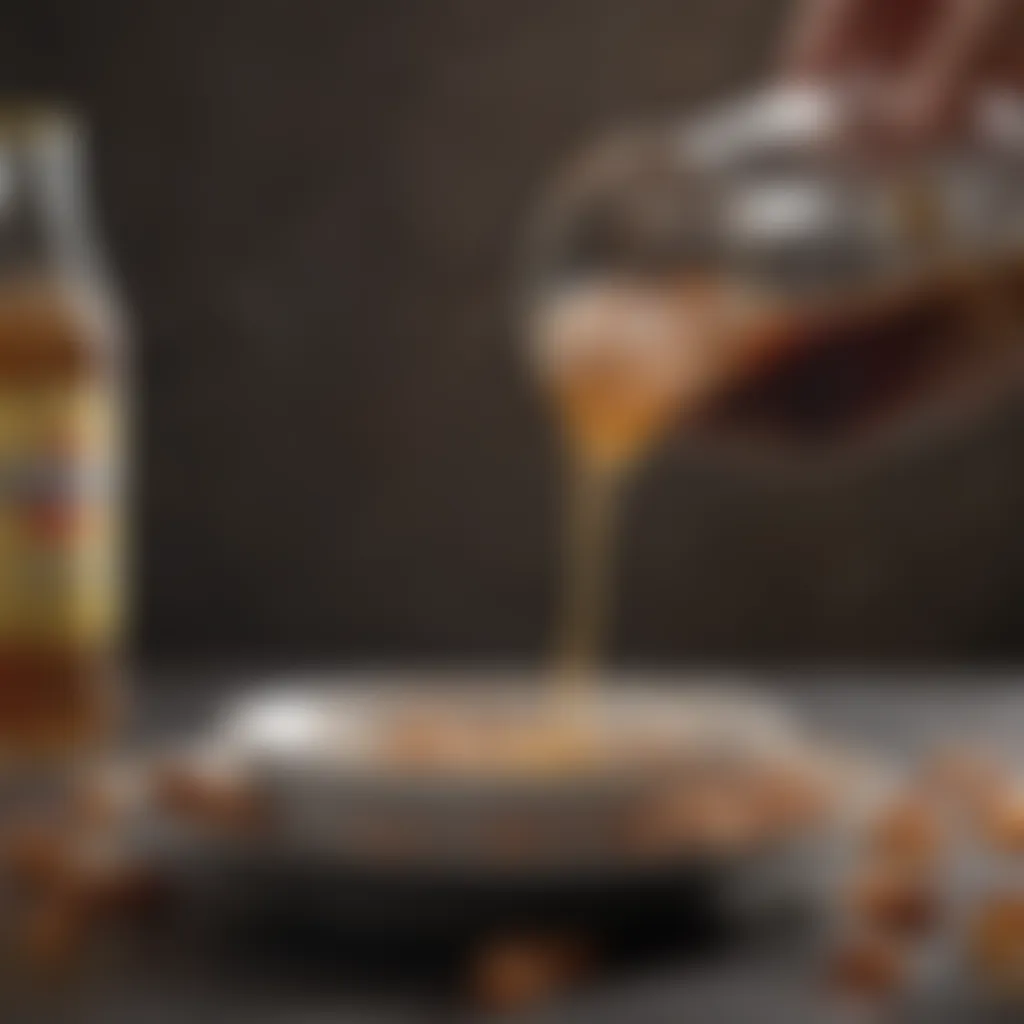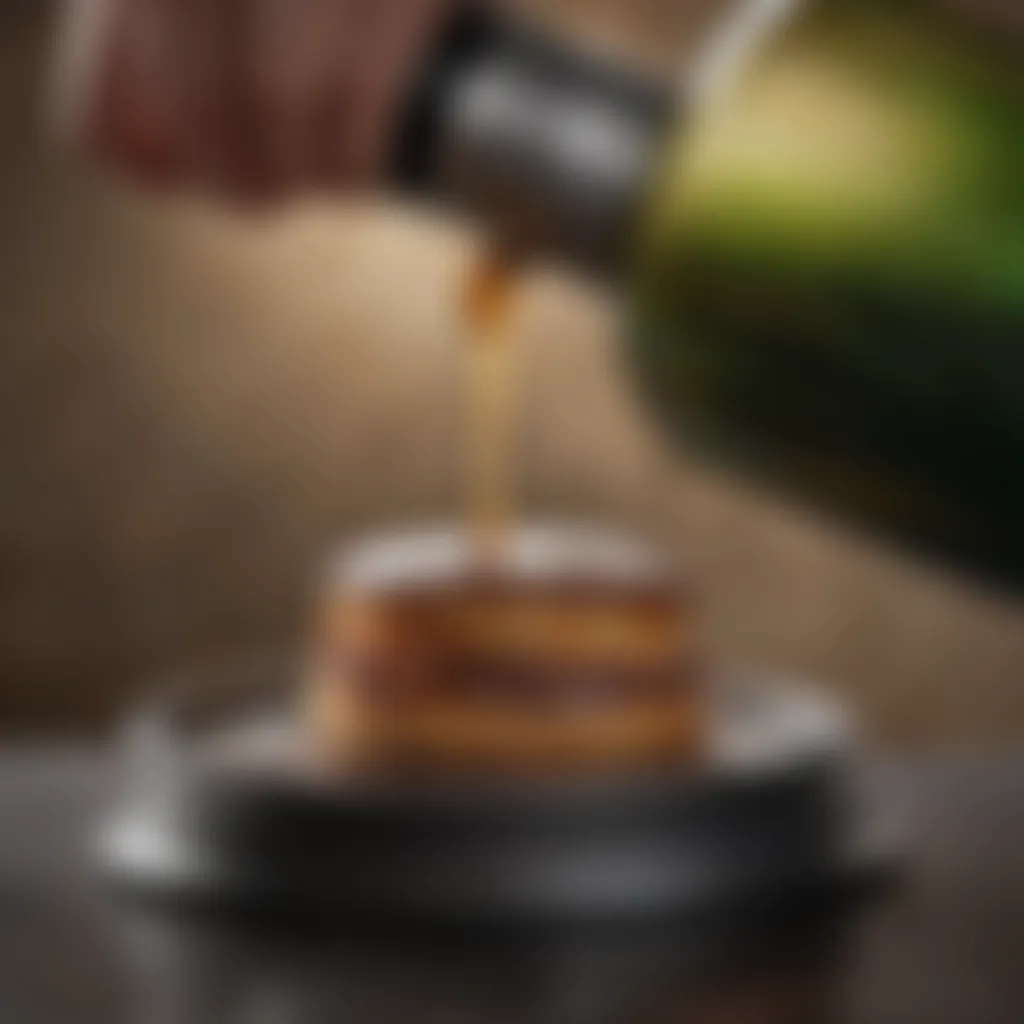Exploring the Benefits of Bottle Top Pourers


Intro
Bottle top pourers have become increasingly popular in both household and commercial kitchens. They serve as an ingenious solution for streamlining the pouring process, providing efficiency and precision. This article seeks to examine the multifaceted aspects of bottle top pourers, from their functionality and design to their practical applications in various settings.
Understanding how these devices work will empower users to select the most suitable type for their needs. Additionally, by delving into the advantages they present over traditional pouring methods and the maintenance required, readers will gain valuable insights into maximizing the utility of bottle top pourers.
Preamble to Bottle Top Pourers
Bottle top pourers are tools designed to improve the process of pouring liquid from bottles. They serve a pivotal role in kitchens, bars, and restaurants, enhancing both the efficiency and effectiveness of service. While many have seen them as simple devices, their utility extends to precision, minimizing waste, and improving the overall experience of beverage serving.
Understanding bottle top pourers involves recognizing their definition and purpose, which sets the foundation for grasping their significance in daily use. These tools cater not only to culinary enthusiasts but also to the professional service industry, bridging the gap between ease of use and sophisticated design.
Definition and Purpose
Bottle top pourers are attachments used to control the flow of liquid from a bottle. Their primary purpose is to make pouring more accurate. They reduce spills and over-pouring, which can save ingredients and maintain cleanliness. The use of a pourer also enhances the pouring experience by allowing a steady stream of liquid. This is particularly important when dealing with expensive ingredients, where wastage can be costly. Different types exist to meet various needs, from cooking oils to wine and cocktails.
The significance of these devices is not limited to household applications; they are crucial in bars and restaurants, ensuring that pouring is consistent. When patrons order drinks, bartenders rely on these pourers for accuracy in variances of measurement and presentation.
Historical Context
The history of bottle top pourers is not extensively documented, but their evolution can be traced back to the rise of consumerism and the emphasis on convenience in food and beverage service. In kitchens and dining establishments, there was a need for tools that allowed for efficient serving without compromising control. As culinary arts advanced and specialized beverages grew in popularity, the demand for better pouring solutions became apparent.
Traditionally, pouring from bottles was a simple task assigned to skilled bartenders or hosts familiar with serving techniques. However, as the industry mechanized, the development of bottle top pourers began in earnest, initially focusing on wine and spirit service. The design and technology of these devices have progressed significantly since their inception, with modern pourers often featuring ergonomic designs, materials that prevent leakage, and designs tailored to specific drinks like wines or oils.
In summary, bottle top pourers are a response to both historical needs and modern requirements for precision in pouring. Their development has paralleled advancements in gastronomy, reflecting a culture that values quality and efficiency.
Types of Bottle Top Pourers
Understanding the various types of bottle top pourers is crucial for anyone looking to improve their beverage service experience. Each type of pourer is designed with specific functions in mind, catering to different kinds of bottles and beverages. By recognizing the distinctions, users can select the optimal pourer that enhances their pouring technique and minimizes wasted liquid. Additionally, proper selection based on the type of drink can contribute to an enjoyable experience and better preservation of flavors. Thus, one must consider the specific elements, benefits, and suitability of each type.
Standard Pourers
Standard pourers serve as a versatile tool for various liquid types. They are commonly used for everyday beverages like oils and vinegars, as well as alcoholic drinks. Their design typically consists of a tapered spout that facilitates a steady flow of liquid. This element of design ensures that users can pour without creating unwanted mess or spillages. Moreover, these pourers are often made from BPA-free plastic or stainless steel, making them easy to clean and long-lasting.
Benefits of standard pourers include their simplicity and adaptability. Universal compatibility with most bottle types allows for easy use. Given their affordability, they often present an attractive option for both novices and experienced users.
Wine Pourers
Wine pourers are specially crafted devices aimed at enhancing the experience of serving wine. These pourers often feature a lip or spout designed to aerate the wine as it is poured. The aeration process enhances the wine's aroma and flavor profile, making it particularly appealing for wine enthusiasts.
Many wine pourers also include a stopper mechanism that helps to minimize oxidation after the wine has been opened. This function is essential for preserving quality over time. When selecting a wine pourer, consider compatibility with bottle sizes, as different wines come in varying neck dimensions. Using a quality wine pourer can greatly elevate the enjoyment of the wine, whether for a casual dinner or a formal event.
Cocktail Pourers
Cocktail pourers are designed to provide precision when crafting cocktails. These devices allow for controlled pouring, which is critical when measuring spirits and mixers. Commonly, cocktail pourers feature a small opening that restricts the flow of liquid, enabling bartenders to mix drinks accurately.
One significant advantage of using a cocktail pourer is that it aids in maintaining the right proportions for recipes. This factor is vital for obtaining the desired taste in any cocktail. Additionally, cocktail pourers are often dirt resistant and can withstand the rigors of frequent use in busy bar environments.
Squeeze Pourers
Squeeze pourers, or bottle squeeze pourers, are unique in design, specifically tailored for dispensing sauces and dressings. These pourers allow the user to control the volume of liquid coming out through a squeezing mechanism.


The benefits of squeeze pourers include their ability to provide precision when dispensing small amounts of thicker liquids. Moreover, they tend to come in a variety of sizes, allowing users to choose based on their specific needs. They are especially useful in cooking settings, where exact measurements of sauces and dressings can make a significant difference in flavor.
Squeeze pourers offer much-needed accuracy, particularly when crafting intricate dishes where precision is key.
Through exploring these various types of bottle top pourers, one can appreciate their individual functions and applications. Choosing the right pourer enhances both the efficiency of serving beverages and the overall experience of the user.
Design Features
The design features of bottle top pourers hold significant importance in their overall functionality and user experience. These elements not only enhance the practical use of the pourers but also contribute to efficiency and effectiveness in beverage service. A well-designed bottle top pourer can make a substantial difference in how liquids are dispensed, impacting everything from flow rates to user comfort.
Materials Used
The materials used in the construction of bottle top pourers are crucial for durability and usability. Typically made from plastics, silicone, or glass, each material has distinct advantages.
- Plastics: Often lightweight and resistant to breakage, which is ideal for everyday use in homes.
- Silicone: Provides flexibility and a tight seal, preventing leaks and drips.
- Glass: Offers aesthetic appeal, often preferred in more upscale settings like restaurants.
The choice of material directly affects how easy the pourer is to clean and maintain. Non-porous materials are generally favored as they do not absorb flavors or odors, preserving the integrity of the liquids dispensed.
Flow Control Mechanisms
Flow control mechanisms are essential for precise pouring. These designs dictate the liquid flow rate and can vary in complexity. Common types include:
- Spouts: Often come with built-in measures to regulate flow. This allows for controlled pouring, particularly important in culinary settings.
- Stopper Designs: Some pourers utilize a stopper that fully seals the bottle when not in use, which is excellent for preserving the quality of the beverage inside.
The effectiveness of these mechanisms can prevent excess liquid from being dispensed or solid ingredients from clogging the spout. Thus, a well-engineered flow control system is vital for both casual and professional users.
Ergonomics and User Experience
User experience is elevated significantly through ergonomic designs. Pourer shapes that fit comfortably in hand can reduce strain during prolonged use. A few considerations are:
- Grip Design: Soft, textured grips can enhance comfort.
- Weight Distribution: A well-balanced pourer can allow for more effortless pouring movements.
These features not only contribute to a more enjoyable pouring experience but also reduce the likelihood of spills or accidents, which is particularly valuable in busy settings like home kitchens or professional bars.
A thoughtful design maximizes efficiency and minimizes user fatigue, making bottle top pourers an essential tool in both home and commercial beverage service.
In summary, the design features of bottle top pourers significantly enhance their effectiveness, making it important for users to consider these aspects when selecting a pourer. The right combination of materials, flow control mechanisms, and ergonomic design will ultimately lead to a better overall experience.
Advantages of Using Bottle Top Pourers
Bottle top pourers offer a range of benefits that enhance both the experience of pouring and the quality of the beverage service. Their design and function make them an important accessory in both home and professional settings. Understanding these advantages can help the user appreciate the practicality that bottle top pourers bring to the table.
Precision in Pouring
Precision is one of the most significant advantages of using bottle top pourers. Unlike traditional methods that can lead to inconsistent pouring, these devices are engineered to control the flow of liquid with accuracy. This feature is especially crucial in culinary settings and for beverages where exact measurements are vital. For example, when preparing a cocktail, having the right amount of liquor is essential.
Furthermore, the design often includes a spout or nozzle that allows for controlled pouring, reducing the risk of over-pouring. This is beneficial for both novices and experienced home cooks alike. As a result, users can maintain consistency in their recipes, ensuring that flavors remain balanced, and that dishes are replicated with ease.
Minimized Spillage
Another compelling advantage is the minimized spillage that these pourers provide. When using a standard bottle, the risk of spilling the contents during transfer is high. However, bottle top pourers are designed to channel liquids precisely into glasses or containers. This efficiency not only enhances presentation but also reduces waste.


Spillage can be particularly troublesome during events or gatherings, where even a small amount of waste can lead to significant losses over time. With a dedicated pourer, users can avoid messy countertops or wasted ingredients.
"Minimized spillage not only saves ingredients but also makes cleaning up after events much easier."
Ease of Use
Ease of use is a critical factor when selecting kitchen tools, and bottle top pourers are no exception. Their designs typically ensure that they can be easily attached and detached from various bottles without hassle. Many users find themselves struggling with fumbling bottles, especially if they have limitations like dexterity issues. Bottle top pourers, in contrast, can often be operated with a simple flick of the wrist.
In addition, most bottle top pourers are dishwasher safe. This means that maintenance is less time-consuming, which is a significant consideration for busy individuals. Overall, the combination of functionality and convenience offered by these pourers makes them a worthy investment for any homeowner looking to elevate their beverage service.
Application Areas
The application areas of bottle top pourers highlight their vast utility across various domains. These devices enhance efficiency and precision in different settings, ensuring that users benefit significantly from their use. Understanding the different application areas is crucial for selecting the right pourer and maximizing its advantages.
Home Use
In home settings, bottle top pourers serve a practical role. They improve the pouring process for everyday use, enabling easy access to liquid from bottles. Households often appreciate the convenience these pourers provide. For instance, when preparing meals or serving drinks, pourers help achieve accurate measurements, especially in recipes requiring specific quantities.
- Convenience: Using a pourer makes serving liquids smoother, reducing the likelihood of spills.
- Versatility: They work well with various bottle types, from olive oil to vinegars and sauces. This allows home cooks to infuse flavors easily without mess.
- Safety: Not only do they make pouring easier, but they also prevent overflow, which can be both wasteful and hazardous.
In summary, at home, bottle top pourers present a simple solution for anyone looking to enhance their cooking and serving processes.
Bars and Restaurants
For bars and restaurants, bottle top pourers are indispensable tools. Their ability to deliver precise pours impacts speed, quality, and overall customer satisfaction.
- Consistency: In busy environments, maintaining drink consistency is crucial. Pourers ensure that each beverage meets the same standards.
- Efficiency: They allow bartenders to serve drinks faster, which can lead to higher table turnover and increased revenue.
- Cost Control: By controlling the flow, these pourers help reduce wastage of expensive spirits and mixers. Over time, this can significantly impact the profits of a bar or restaurant.
In this context, the choice of pourer can affect both the quality of service and the bottom line of the business. The right pourer contributes to an establishment's reputation for being professional and attentive to detail.
Catering Events
Catering events also benefit greatly from the use of bottle top pourers. Particularly in large gatherings, these tools streamline the serving process and contribute to a cohesive experience for guests.
- Speed: Event staff can prepare and serve drinks more quickly, which is particularly important during high-demand moments.
- Professionalism: Using bottle top pourers can enhance the presentation of the service, showcasing a level of dedication to quality.
- Variety Handling: In catering, different types of beverages must be served, and using appropriate pourers simplifies this task. For example, wine pourers can facilitate a smoother flow than a traditional bottle neck.
Catering professionals recognize the necessity of effective tools like pourers to ensure a successful event.
"Efficiency in beverage service can make or break an event; the right pourers are key to this success."
Choosing the Right Pourer
Selecting the appropriate bottle top pourer is essential for any household. The right pourer not only delivers the desired efficacy in pouring but also enhances the overall experience of serving beverages. Understanding the nuances of various designs, materials, and functionalities can significantly impact your decision. An ideal pourer will also consider your specific needs and preferences, ensuring that it complements both functionality and aesthetics in your kitchen or dining space.
Factors to Consider
When choosing a bottle top pourer, several factors come into play that can affect the pouring experience:
- Type of Beverage: Different pourers are designed for specific types of beverages. Wine pourers, for example, often incorporate aeration features that enhance the aroma and taste of wine, making them distinct from standard pourers meant for oils or vinegar.
- Material Quality: The material influences both durability and esthetics. Common materials include plastic, stainless steel, or even silicone. Stainless steel typically offers longevity and a refined look, while silicone options may allow for flexibility and ease of cleaning.
- Ease of Cleaning: Pourers that require complex cleaning procedures can become a nuisance. It is worthwhile to consider products that allow easy disassembly or are dishwasher safe, ensuring that maintenance is hassle-free.
- Pour Control: Some pourers feature flow control mechanisms that allow for precision pouring. This is especially important when precise measurements are necessary, such as in baking or cocktail crafting.
- Ergonomics: A comfortable and thoughtfully designed pourer can greatly enhance user experience. If a pourer feels good in the hand and is intuitive to use, it will likely be preferred over more cumbersome options.
Matching Pourers to Bottle Types


Not all pourers fit all bottles. It's crucial to match the pourer to its intended bottle type to ensure optimal performance.
- Standard Bottles: For most standard bottles, such as oil or balsamic vinegar, a universal pourer can suffice. However, aiming for a snug fit with the neck of the bottle is recommended to minimize spills.
- Wine Bottles: Wine bottles generally have larger openings. Using a specially designed wine pourer not only aids in pouring but also provides aeration features that enhance the wine's flavor profile.
- Spirit Bottles: Bottles containing spirits often require a pourer that can manage a faster flow rate. There are numerous options available that can achieve this while minimizing spillage.
- Unique Bottle Shapes: For uniquely shaped bottles, such as those that are tapered or have unusual spouts, it is best to select pourers explicitly designed to accommodate these shapes. This ensures proper flow and a stable pouring experience.
When choosing a pourer, consider both the practical and aesthetic elements. The right pourer should feel like a natural extension of your beverage service.
Maintenance and Care
Maintaining and caring for your bottle top pourers is essential for their longevity and optimal performance. Proper maintenance enhances the functionality of these devices, ensuring that they deliver precise pouring without any hiccups. By prioritizing care, not only do you protect your investment, but you also contribute to a better tasting experience every time you use your bottle top pourers.
One of the primary elements of maintenance involves cleaning the pourers. If not properly cleaned, residue from previous liquids can build up and lead to contamination. This is especially important for pourers that have been used for different types of beverages like oils, balsamics, or spirits. Regular cleaning ensures that every pour you make is clean and free from any lingering flavors, which can affect the quality of what you're serving.
Additionally, correct storage of these devices plays a crucial role in their maintenance. Proper storage techniques can prevent damage and prolong the lifespan of your pourers. For instance, extreme temperatures and exposure to sunlight can deteriorate the materials. Thus, it is vital to follow specific guidelines to keep them in excellent condition, preserving their functionality and appearance.
Key Points of Maintenance:
Regular cleaning prevents buildup and contamination.
Proper storage protects against damage and degradation.
Enhanced functionality leads to a better pouring experience.
Cleaning Instructions
When it comes to cleaning your bottle top pourers, the approach may vary slightly depending on the type of material used. Most pourers can be hand washed, making it a straightforward process. Here are some guidelines to keep in mind:
- Disassemble when possible: If your pourer can be taken apart, do so. This allows you to reach all surfaces more effectively.
- Use warm, soapy water: A mild detergent works well for removing residues. Avoid any harsh chemicals that may damage the materials.
- Clean the spouts: Pay extra attention to the spout area, as this is where build-up often occurs. Use a small cleaning brush if necessary.
- Rinse thoroughly: Make sure to eliminate any soap residue. Rinse under running water until clear.
- Air dry: Leave the pourers to dry on a clean towel or drying rack. Avoid using heat sources as they may warp or damage the material.
Following these steps will help ensure your bottle top pourers remain in top shape for future use.
Proper Storage Techniques
Storing your bottle top pourers correctly is just as crucial as cleaning them. The right storage practices can help maintain their shape and functionality. Consider the following techniques:
- Keep in a cool, dry place: Avoid areas with humidity or extreme temperature changes, which can affect the materials of the pourers.
- Use a dedicated container: Store them in a drawer or container that is clean and free from clutter. This prevents any accidental damage.
- Avoid direct sunlight: Prolonged exposure can cause fading or material degradation, so keep them away from windows or direct light sources.
- Store separately: If possible, keep different types of pourers apart to avoid cross-contamination of odors or residues.
Innovations in Bottle Top Pourers
The field of bottle top pourers has seen significant advancements in recent years, bringing forth innovations that enhance both functionality and user experience. These developments are notable not just for their technical advancements but also for their impact on efficiency in both home kitchens and commercial settings.
One of the prominent transformations involves the rise of smart pourers. These devices integrate technology and convenience, allowing users to control pouring precisely and effectively. Smart pourers can often be connected to applications on smartphones, providing optimal flow rates and measurement controls. Such features ensure that you can pour exactly the right amount, which is crucial in recipes that require accuracy. This is especially beneficial for those who enjoy experimenting with drinks or cooking.
Another essential aspect of recent innovations focuses on sustainability. Many modern pourers are designed using eco-friendly materials that not only reduce environmental impact but also improve the longevity and durability of the product. This shift toward sustainable design speaks to a growing awareness among consumers regarding the importance of reducing plastic waste. Innovations in materials ensure that the pleasrue of pouring does not come at the cost of environmental degradation.
"Sustainable practices in design have become a key consideration for today's consumers, showing a movement towards more responsible choices."
Moreover, advancements in design considerations have led to easier cleaning and maintenance processes. Several new models of pourers allow for parts to be disassembled and cleaned effectively, thereby prolonging their lifespan and utility. This is a clear positive for busy households where time is a premium.
In summary, the innovations in bottle top pourers not only improve user experience through technology integration and sustainable materials but also address practical concerns around maintenance. These innovations open the door for a quicker, cleaner, and more efficient way of pouring beverages, ultimately enriching the overall enjoyment of the user experience.
Finale
The conclusion is an essential part of this article, as it encapsulates the main ideas presented throughout the text. It ties together the various aspects of bottle top pourers, highlighting their significance in both personal and professional settings. Understanding the functionality of these devices can lead to improved efficiency and enjoyment in serving beverages.
Summarization of Key Points
- Types of Pourers: This article examined various types of bottle top pourers, such as standard pourers, wine pourers, cocktail pourers, and squeeze pourers. Each serves a unique purpose and addresses different user needs.
- Design: The materials used in the construction of these pourers, along with their flow control mechanisms, are critical for user experience. Ergonomic designs make pouring easier and more pleasant.
- Advantages: Bottle top pourers provide precision in pouring, minimizing spillage. This not only saves drinks but also enhances the presentation of beverages.
- Application Areas: The uses of these pourers extend beyond home kitchens to bars, restaurants, and catering events, thus proving their versatility.
- Maintenance: Proper care and storage are necessary to maintain the quality and longevity of these devices.
- Innovations: New advancements, such as smart pourers that integrate technology, are shaping the future of beverage service.
Future Trends
Looking ahead, the evolution of bottle top pourers will likely focus on two main areas. First, there will be an increasing integration of smart technology into these devices, allowing for enhanced control over pouring measurements and even tracking consumption.
Second, there is a growing trend toward sustainability. Consumers are becoming more aware of the environmental impact of their choices. As a result, manufacturers may utilize biodegradable or recycled materials in the production of bottle top pourers. This shift not only addresses ecological concerns but also appeals to a conscientious consumer base.
Ultimately, as bottle top pourers evolve, they will continue to play a pivotal role in optimizing beverage service and storage. Their impact will resonate both in the kitchen and in the broader hospitality industry, making them indispensable tools for many.







